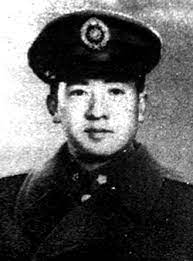Ma Pu-fang (1903-), Chinese Muslim general who was governor of Tsinghai from 1938 until 1949. He later served the National Government in Taiwan as ambassador to Saudi Arabia, but he resigned in 1961.
Linhsia (Hochow), Kansu, was the birthplace of Ala Pu-fang. He was the younger brother of Ma Pu-ch'ing (q.v.) and the son of Ma Ch'i, who served as governor of Tsinghai from 1 929 to 1931. Ma Ch'i was succeeded as governor by his brother. Ma Lin. Although Ma Pu-fang received a primary education designed to prepare him for a career as a Muslim Imam, he soon decided that he would rather be a military man. After being graduated from the Ninghai Officers Training Corps, he joined the Ninghai Army in 1920 as a deputy battalion commander. By the end of 1930 he had risen to become commander of the Provisional 1st Division (later the 9th Division) in the Nationalist forces of Ku Chu-t'ung (q.v.), then the pacification commissioner for northwest China. Ku appointed Ma garrison commander for all of southern Tsinghai and ordered him to march on Ma Chung-ying (q.v.) who had been attempting to consolidate an independent base of power in Kansu. Ma Pu-fang soon drove Ma Chung-ying westward, scattering his forces. He then returned to his garrison station at Yüshu in Tsinghai.
Early in 1932 Ma Pu-fang cooperated with Liu Wen-hui (q.v.) in working out a plan for ending the Chinese-Tibetan struggle that had begun with the Ta-chin-ssu affair of 1930, when Tibetan lamas and Chinese soldiers had clashed at Kantzu. They recovered Kantzu and Chanhua, and by July 1932 their forces had reached the Chin Sha River. Liu Wen-hui signed a local agreement with the Tibetans in October 1932, and Ma Pu-fang negotiated a Tsinghai-Tibetan peace treaty which was submitted for National Government approval in July 1933. I Although Ma Lin was the titular head of the Tsinghai government from 1931 to 1938, Ma Pu-fang was named acting governor of Tsinghai and commander of the 82nd Division. He was confirmed as governor in 1938, whea Ma Lin received membership in the State Council. By this time, the Sino-Japanese war had broken out and the 82nd Division had been reorganized as the Eighty-second Army. The retreat of the National Government to Chungking greatly increased the strategic importance of northwest China. Ma Pu-fang, to strengthen his province and to block Japanese intrigue among the Chinese Muslims of the northwest, undertook what he termed ''The Six Great Tasks"—the organization of a pao-chia system, the creation of a military reserv^e, the enforcement of prohibitions on opium, the improvement of literacy, the construction of provincial highw-ays, and the development of forests. Ma Pu-fang's administration was one of the most efficient in China. He introduced modern medicine to the province, initiated irrigation projects, and built factories for the manufacture of such goods as pottery, chemicals, and matches. By government order, everyone in the province—even officials, lamas, and students—had to plant several trees each year as part of the reforestation program. The citizens of Sining periodically had to meet a daily quota of dead flies, their contribution to Ma's sanitation program. Ma paid special attention to education. Citizens between the ages of 15 and 20 were taught 1,000 Chinese characters in special classes, and by 1942 almost 100,000 of them had learned to read. Ma's government established primary and secondary schools throughout the province and provided all Tsinghai students With uniforms, books, and other school supplies. Ma also gave strong moral and financial support to a private school system known as the K'unlun Schools, which provided comprehensive education for Muslim students. Although Ma's regime was highly authoritarian, it was a benevolent dictatorship. Furthermore, the reform and development programs did not place a heavy tax burden on the people, for the gov^ernment supported itself mainly through industrial and commercial monopoly. In 1943 Ma Pu-fang was appointed commander in chief of the Fortieth Group Army, with Ma Pu-ch'ing as deputy commander. Two years later, he became a deputy chairman of Chiang Kai-shek's northwest headquarters and a member of the Kuomintang's Central Executive Committee. The Fortieth Group Army was disbanded in 1946, just a few months after the War in the Pacific ended, and Ma was given the post of deputy director of the northwest military and political affairs administration at Lanchow. When Chang Chih-chung (q.v.) declared allegiance to the Chinese Communists in 1949, Ma succeeded him as director of the northwest headquarters. After returning from a conference at Canton with acting President Li Tsung-jen (q.v.) and other Nationalist leaders in July, Ma packed his possessions and moved to Hong Kong. Lanchow and Sining fell to the Chinese Communists soon after he left Tsinghai. Ia Pu-fang went to Egypt in the early 1950's and remained there until that country recognized the People's Republic of China in 1957. He then accepted an appointment as Nationalist ambassador to Saudi Arabia. In May 1961 the National Government in Taiwan announced that he had been charged with corruption and incompetence and that his resignation had been accepted by the ministry of foreign afTairs. Ma Pu-fang continued to live in the Middle East.

马步芳
字:子香
马步芳(1903—),回族将军,1938—49年任青海省主席,后任台湾国民政府驻沙特阿拉伯大使,1961年辞职。
马步芳生在甘肃临夏,是马步青的弟弟,1929—31年任青海省主席马麒的儿子,马麒死后由其弟马麟任青海省主席。马步芳起初接受当阿訇的教育,后决定从军。他在宁海军官训练团毕业后,1920年入宁海军当副营长,1930年底,在顾祝同部队当暂编第一师师长(后改为第九师),以后又当了西北缓靖主任,顾任命他为青海南部警备司令,命令他进攻准备以甘肃为基地谋求独立的马仲英。马步芳击溃了他的部队,把马仲英赶往西边,回玉树当警备司令。
1932年初,马步芳和刘文辉合作准备解决1930年在甘孜发生的大清寺汉族士兵同藏族喇嘛发生冲突事件。他们收复了甘孜、瞻化,是年7月,所部到达金沙江。1932年2月,刘文辉与藏族签订协定,马步芳签订了青海西藏和平条款,1933年7月提交国民政府批准。
1931—38年青海省主席名义上是马麟,实际上由马步芳代行。他兼任八十二师师长,1938年马麟当上了国府委员,马步芳被正式任命为青海省主席。此时,中日战争已爆发,八十二师改编为八十二军。国民政府迁往重庆后,西北的战略地位更见重要,马步芳为加强其在青海统治,防阻日军在西北回族中进行挑拨,采取“六项重要措施”:编组保甲、训练壮丁、厉行禁烟、推行识字,修筑公路、营造树林。
马步芳的行政效率当时在国内居于前列,他在省内推行西医,兴修水利,创设工厂生产陶瓷、化学用品及火柴等,省政府还下令,省内每个人不管是官吏、喇嘛还是学生,每年必须种几棵树,以实现造林计划。西宁的居民必须定期消灭一定数量的苍蝇,以完成马步芳的卫生计划。他还特别注意教育,令年在十五岁至二十多岁之间的居民必须参加专门的文化班,认识一千个汉字。因此到1942年时,约有十万多人已具有阅读能力。省当局在全省设立了小学、中学,全体学生免费供应制服、书籍、文具,马步芳还给名为昆仑学校的私立学校以有力的道义上和财政上的支持,这类学校是为了向回族学生进行综合性教育而开办的。马步芳的统治虽然是高度专制的,但不失为一种开明的专政。此外,这些改革和发展计划的经费来源主要得之于省府专营的工商业,因此并未加重人民的税收负担。
1943年,马歩芳任第四十集团军司令,马步青为副司令,两年后,他就任西北行营副主任,国民党中央执行委员。1946年太平洋战争结束后几个月,第四十集团军撤销,马步芳任驻兰州的西北军政长官公署长官。1949年,张治中投向中国共产党,马步芳继任西北行营主任,7月,他去广州与李宗仁及国民党委员商谈后,回青海携带家财迁居香港,不久中国共产党攻克西宁、兰州。
五十年代初期,马步芳去埃及,一直到1957年埃及政府承认中华人民共和国为止,以后任国民党驻沙特阿拉伯大使。1961年5月,台湾国民政府宣布他被控有贪污行为,办事无能,外交部准其辞职。但此后马步芳仍居留在中东。